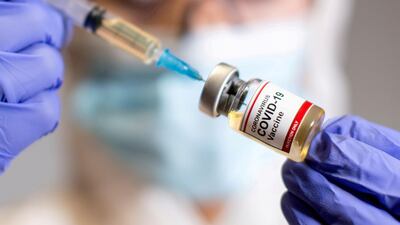The UN on Thursday will host a summit on tackling the coronavirus pandemic amid mounting calls for vaccine producers to make the life-saving injections cheap enough for poor nations to access.
Canadian Prime Minister Justin Trudeau, German Chancellor Angela Merkel and other leaders will discuss access to vaccines, coronavirus misinformation and other worries at the two-day online meeting.
Wealthy governments have sealed deals to purchase vaccines in mass with Pfizer, Moderna, BioNTech, AstraZeneca and other drug makers but the UN says its Covax scheme for vaccinating the world’s poor remains badly underfunded.
Anna Marriott, a health policy chief at the aid group Oxfam, on Wednesday urged Covid-19 vaccine makers Pfizer and BioNTech to do “much more to ensure all countries that need the vaccine are able to get it".
"Currently, Pfizer and BioNTech have promised the vast majority of available doses to rich countries, while most poorer countries face an impossible battle to secure enough doses," Ms Marriott said.
“Unlocking more supplies would require pharmaceutical companies … to share their Covid-19 vaccine technology and intellectual property so that enough doses can be made.”
The coronavirus pandemic has killed about 1.5 million people globally and infected more than 64 million.
It has wiped out hundreds of millions of jobs, plunged millions into extreme poverty and pushed the world economy into recession.
The US, Britain, France, Germany and other rich countries have directly negotiated deals with drug makers, meaning that most of the world’s vaccine supply for next year has been reserved.
Global Justice Now, an organisation that campaigns on issues of justice and development in poor countries, said 80 per cent of Pfizer’s Covid-19 vaccine doses and 78 per cent of Moderna’s have already been bought.
Britain on Wednesday became the first western country to approve a Covid-19 vaccine for general use, and announced Pfizer-BioNTech's drug would be available next week through the National Health Service.
The Covid-19 vaccine produced by Oxford University and AstraZeneca will be sold to developing countries on a non-profit basis.
Pfizer’s vaccine requires ultra-cold storage, which may make it unusable in much of the developing world.
India, South Africa and other developing countries have pushed at the World Trade Organisation for a relaxation of drug makers’ intellectual property rights, saying they should be able to make vaccines themselves.
UN spokesman Stephane Dujarric on Wednesday said the world body’s Covax plan, which involves rich countries and charities developing and distributing vaccines at “no cost or low cost” in the developing world, remained underfunded.
“We would like to see lower costs for the vaccine,” Mr Dujarric said.
As part of the UN talks on Friday, World Health Organisation Director General Dr Tedros Adhanom Ghebreyesus is due to discuss making vaccines for all a “global public good” with executives from the major vaccine producers.


